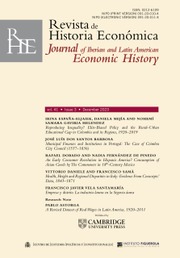Article contents
REDISCOVERING AMERICA: POLITICAL ECONOMY OF SPANISH COLONIES ACCORDING TO THE EXPLORERS JUAN-ULLOA, MALASPINA AND HUMBOLDT*
Published online by Cambridge University Press: 24 August 2015
Abstract
Two scientists and sailors from the Spanish Navy, Jorge Juan and Antonio de Ulloa, the Italian sailor and explorer Alessandro Malaspina, and the German sage Alexander von Humboldt were the main actors in three great voyages to Spanish America between the second-third of the 18th century and the beginning of the 19th century. This enabled them to provide three first hand «photographs» of the state of the Spanish empire in America at three different moments in time: approximately before, during and after the implementation of colonial reforms designed in the reigns of Ferdinand VI and Charles III. This work aims, in the first place, to compare the socio-economic views of Spanish America deriving from the three expeditions, highlighting similarities and differences. Second, this work aims to connect the analysis of the weaknesses of the politico-institutional organisation of Spanish colonies, which the four travellers did at first hand, with the present debate on the role of colonial institutions in long-term economic development.
Resumen
Los científicos y marinos de la armada española Jorge Juan y Antonio de Ulloa, el marino y explorador italiano Alessandro Malaspina, y el sabio alemán Alexander von Humboldt, fueron protagonistas de tres grandes viajes a la América española realizados entre el segundo tercio del siglo XVIII y comienzos del XIX. Ello les permitió ofrecer tres «fotografías», de primera mano, de la situación económica del imperio español en América en tres momentos distintos: aproximadamente antes, durante y después de la puesta en práctica de las reformas coloniales diseñadas en los reinados Fernando VI y Carlos III. Este trabajo pretende, primero, comparar las visiones socioeconómicas de la América española derivadas de las tres expediciones, destacando convergencias y divergencias, y segundo, conectar el análisis de los problemas institucionales del imperio realizado por los cuatro viajeros con el debate actual sobre el papel de las instituciones coloniales en el desarrollo económico a largo plazo.
Keywords
- Type
- Articles/Artículos
- Information
- Revista de Historia Economica - Journal of Iberian and Latin American Economic History , Volume 34 , Issue 1 , March 2016 , pp. 135 - 159
- Copyright
- © Instituto Figuerola, Universidad Carlos III de Madrid, 2015
Footnotes
We are very grateful to Barry Readman, the anonymous referees and the editors of the journal for their help and suggestions.
Departamento de Historia e Instituciones Económicas I, Facultad de Ciencias Económicas y Empresariales, Universidad Complutense, Campus de Somosaguas, 28223 Pozuelo de Alarcón, Madrid, España. [email protected]; [email protected].
References
REFERENCES
- 1
- Cited by



